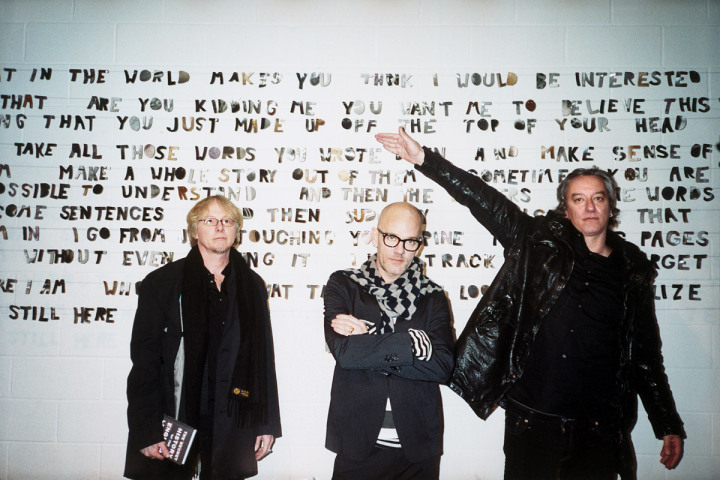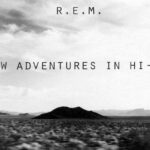Forty years on from their formation, and 10 years on from their break up, R.E.M. remain one of the most lauded bands of their era, as well as one of the most commercially successful. Significant anniversaries of their classic albums seem to pop up on a regular basis, with accompanying boxset rereleases and critical revisitations. The albums that are considered ‘classic’ in their back catalogue, however, rarely if ever include any of the band’s final five releases. These albums are, of course, the ones the band recorded following the departure of drummer Bill Berry, but is it fair to dismiss the band’s post-Berry work, or does it deserve revaluating?
Berry left the band during early demo session for 1998’s Up, and, with him retired from music and working as a farmer, it’s easy to think this is the album that most clearly suffers from his absence. Berry was more than just a drummer, he was a multi-instrumentalist who contributed significantly to the song-writing process (songs like ‘Perfect Circle’ and ‘Everybody Hurts’ started with him), and let’s not forget his part in the three-part harmonies that make ‘Fall On Me’ or ‘Find The River’ soar, and were an R.E.M. trademark. Screaming Trees‘ Barret Martin and Beck session player Joey Waronker appeared as session drummers, but the album relied more on analogue drum machines and loops than live drumming. The slightly cold feeling of this experimentation with low-level electronica left many fans, well… cold. Rather than being a choice imposed on them, this wasn’t purely out of necessity, as the band had already been working on the use of drum machines with Berry before he departed, continuing a loosely experimental phase that had begun in places on the proceeding New Adventures...
There’s no denying, though, that losing Berry had a profound effect on the band and this album in particular. The strife that the band went through can be seen in the fascinating documentary ‘Falls To Climb’. Fascinating, not just as yet another chronicling of the making of an album, but because it shows one of the biggest bands of all time really struggling to find their creative feet.
It’s fair to say that, a few stand-out tracks aside, the overall result is, at best, an ‘interesting’ album, and for a band like R.E.M. ‘interesting’ just isn’t enough for the majority of their fans. I like the album, but it’s probably telling that the only tracks from it that the band continued to play live for any length of time are ‘At My Most Beautiful’ and ‘Daysleeper’, the latter more recognisably R.E.M., the former a Beach Boys-like pop song that heavily featured Mills’ distinctive harmonies, an element largely absent from the album.
A year later the band recorded their first soundtrack, for the Andy Kaufman biopic “Man ON The Moon”, the first time they had recorded an original soundtrack. The single ‘The Great Beyond’ was released. It was melodic but unremarkable and, although it flopped in America, extraordinarily it became their most successful ever British single.
In 2001 the band returned with Reveal, an album mostly shorn of experimentation, which was instantly more well-received by critics and the record-buying public. Unlike ‘Up’, ‘Reveal’ contained two obvious hit singles in the form of ‘All The Way To Reno ‘and ‘Imitation Of Life’, and had a summery, pop feel that was in marked contrast to their previous two albums.
Warner Bros. decided to capitalise on the relative surge in popularity by releasing a best-of album, In Time in 2003. As well as the bigger hits of the Warner Bros era, the compilation contained two new songs, ‘Animal’ and ‘Bad Day’, the latter in particular, and up-tempo, political rocker, became an instant fan favourite. Any hope this would provide a resurgence was tempered by the knowledge that the track was originally written during the sessions for the classic Document album way back in 1987.
2004’s Around The Sun marks an indisputable low for the band. Having produced definitive albums of the previous two decades, this album has the feel of a band going through the motions. Opening track and lead single ‘Leaving New York’ promised much, but that promise was infrequently delivered upon. ‘Aftermath’ and ‘I Wanted To Be Wrong’ bring the average up a bit, while ‘The Outsiders’, featuring Q-Tip, is a far better attempt to incorporate a rap into an R.E.M. song than the more feted ‘Radio Song’ from ‘Out Of Time’, but songs like ‘High-Speed Train’, ‘Boy In The Well’ and ‘Wanderlust’ frankly are barely worthy of inclusion on a collection of R.E.M. studio outtakes, let alone on an actual album. Peter Buck, always reliably honest in his assessment of his band’s material once the dust has settled, described the album as ‘not really listenable’, and the band felt like they didn’t really believe in the songs they’re recording. Producer Pat McCarthy attempted to make up for the shortcomings in the songwriting with layers of lush production, but this merely served to highlight the lack of depth. An example of this is ‘Final Straw’, a simple protest song weighed down with unnecessary percussion and guitar tracks.
Many thought Around The Sun would finish the band, and it was four years before they released another album. Fortunately, they had learned harsh lessons, and Accelerate possessed an urgency lacking from the previous few albums. Dispensing with producer Pat McCarthy and enlisting former Compulsion guitarist Jacknife Lee, the recording schedule for the album was the shortest the band had ever had, which helped dispense with the lazy, can’t-be-arsed feeling of Around The Sun. Opener ‘Living Well Is The Best Revenge’ sets the tone; a loud guitar riff ushering in some of Stipe’s edgiest vocals. The first single ‘Supernatural Superserious’ carries on the theme and has the feel of a band who have learned how to enjoy themselves again. As well as being one of their rockiest recordings, Accelerate is also their most political album since Document, reflecting the post-Katrina climate in America. Accelerate also arrested the commercial decline of the band, selling more than any of their albums since New Adventures…
2011’s Collapse Into Now, while far from a classic, represented a decent swan song for a band that had arguably recorded three or four of the all-time greatest albums, but had struggled to some degree in recent years. There was a sense of consciously going over old ground; Patti Smith making an appearance on ‘Blue’, which was essentially an inferior rehashing of ‘E-bow The Letter’, and ‘Walk It Back’ is dangerously close to ‘Around The Sun’ territory, but the album is predominantly made up of high-energy punk-pop like ‘Mine Smell Like Honey’, ‘Alligator_Aviator_Autopilot_Antimatter’ (featuring vocals from Peaches) and ‘All The Best’. The stand-out tracks, though, are undoubtedly ‘Oh My Heart’ (a sequel of sorts to the Katrina-themed ‘Houston’ from ‘Accelerate’) and, especially, ‘It Happened Today’, a very nice but by no means extraordinary song for one minute and 25 seconds. Then the harmonies kick in, and what follows is two minutes and 24 seconds of some of the most amazing, layered vocals you’ll ever hear from Stipe, Mills, Joel Gibb, and Eddie Vedder, that by rights should have been the last thing you ever heard on an R.E.M album.
Following the group’s split, three new songs appeared on the greatest hits album Part Lies, Part Heart, Part Truth, Part Garbage 1982-2011, but only the Bacharach-like ‘We All Go Back To Where We Belong’ was noteworthy. It was released as the final ever R.E.M. single and felt like a fitting way to bring down the final curtain on an incredible career.




